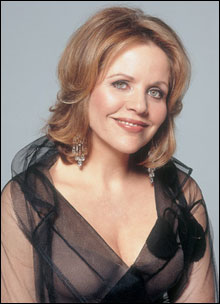
VARIETY SHOW: Renée Fleming and the PSO. |
In times of crisis, many people look to the stars for guidance. On February 17, the Portland Symphony Orchestra will look toward one of the brightest stars in the classical world — opera star Renée Fleming.As the symphony struggles with budget cuts and a shrinking endowment, it also prepares to welcome Fleming, the two-time Grammy-winning superstar soprano. Amid general economic turmoil, the PSO has had its most successful season ever, if success were measured entirely by concert attendance. Ticket sales are up, even as the symphony's primary donors are writing fewer checks.
"There are superstar artists out there in the classical and opera world, and Renée is certainly one of them," says music director Robert Moody.
Fleming, who performs regularly with the Metropolitan Opera in New York City, has spent the 2008-2009 season traveling the world to perform with symphonies from the Vienna State Opera, to the Orchestre National de France, to an upcoming end-of-season performance of Verdi's famous opera La Traviata at the Covent Garden Opera House in London. Fleming released a new album late last year titled Four Last Songs: Richard Strauss: Songs & Arias (Decca). Tuesday's performance will include works from that disc.
The program will begin with Strauss's Der Rosenkavalier Suite, the suite from one of the composer's most popular operas. Der Rosenkavalier, or The Knight of the Rose, is the story of a servant boy sent to deliver a silver engagement rose to his master's betrothed, but who instead falls in love with the girl and she with him. The opera was incredibly successful at its premiere in 1911, and has continued its popularity over the past century. The work is a comic opera, and the suite is a perfect way to highlight Fleming's talents while setting the tone for the rest of the show.
After an operatic opening, Fleming will shift gears to sing the Vier letzte Lieder, or Four Last Songs.
"The Four Last Songs are Strauss writing about the autumn of life. They're unbelievably poignant," says Moody.
Strauss was in his 80s when he wrote the songs and did not live long enough to hear their premiere in 1950. Although the songs exhibit some signs of Strauss's knowledge of his impending demise, there is an accepting tone about them. Having lived a long and successful life, these songs were Strauss's gift to the world, works he must have known he would not live to hear.
To end the first half, Fleming will perform the Morgen, op. 27 no. 4 or Morning, also by Strauss.
"It is the perfect epilogue to the Four Last Songs. It is a (mournful piece) about the Afterlife, about the finding of peace," explains Moody.
During intermission, Fleming will change more than her dress. She will also shift from being an opera singer into a Broadway starlet. The second half of the program will contain a variety of popular songs, including Gershwin's "Summertime" from Porgy and Bess and a medley from Carousel by Richard Rogers.
"(Fleming) is interested in variety. I like variety. It goes well with what we've been trying to do this season: Great serious music and light pop music," says Moody.